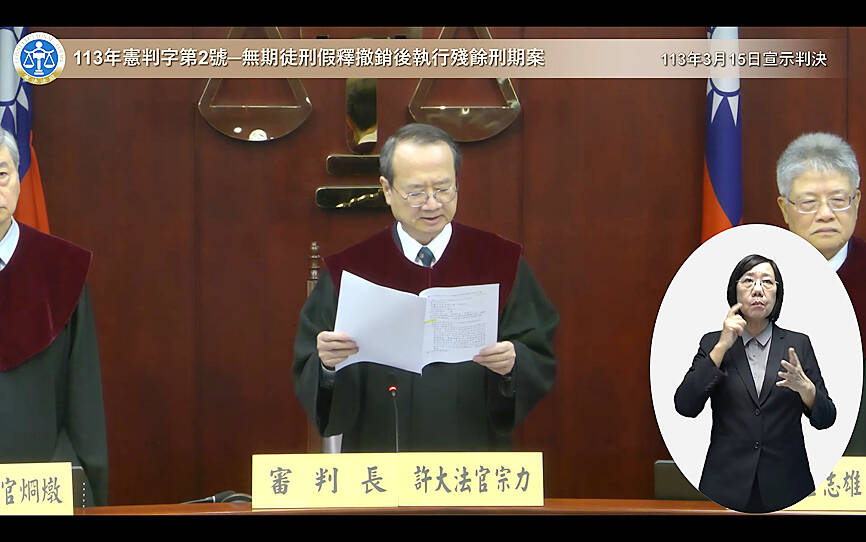A Criminal Code provision requiring repeat offenders to serve up to 25 years with no chance of parole if they violate the law during their parole contravenes the Constitution, and should be amended within two years, the Constitutional Court said yesterday.
Hsieh Chao-he (謝朝和), who was sentenced to life in prison for violating the now-defunct Act Punishing Thievery and Banditry (懲治盜匪條例), was in 2009 granted parole after serving 18 years.
However, his parole was revoked after he was convicted of theft and ordered to serve 25 years in jail without parole. Hsieh said the sentence was “disproportionate” to the crime and requested a constitutional interpretation.

Photo: screen shot from a Constitutional Court livestream
Another 35 similar cases were merged into one in the Constitutional Court’s review of Hsieh’s request.
The Constitutional Court yesterday said that the revocation of the accused’s parole had not considered the severity of the repeat offense nor the effects of the rehabilitation program on the accused during the time of parole.
Ordering the accused to serve out the remainder of their previous sentence before their parole for up to 25 years violates the principle of proportionality and fails to observe the spirit of Article 8 of the Constitution, the court said.
The competent authority should amend this provision in the Criminal Code within two years, it said.
If the law is not amended within the given period, the competent authority should rescind rulings and instead implement measures more in line with the principle of proportionality, it said.
Five appeals were certified to have contravened the Constitution and have been remanded to the Supreme Court, it said, adding that chief prosecutors are within their rights or can act if petitioned by others to lodge an extraordinary appeal on the ruling.
The Supreme Court should halt legal proceedings of the cases until the amendment is passed and then review the case with the amended Criminal Code in mind, it added.
As for other convicts facing a similar situation, but who were not part of the five appeals, the Constitutional Court said that if they voice opposition regarding their cases following the constitutional interpretation or if their cases are on trial, the courts presiding over the cases should halt all legal proceedings until the amendment has been promulgated.

The Ministry of the Interior (MOI) is to tighten rules for candidates running for public office, requiring them to declare that they do not hold a Chinese household registration or passport, and that they possess no other foreign citizenship. The requirement was set out in a draft amendment to the Enforcement Rules of the Public Officials Election and Recall Act (公職人員選舉罷免法 ) released by the ministry on Thursday. Under the proposal, candidates would need to make the declaration when submitting their registration forms, which would be published in the official election bulletin. The move follows the removal of several elected officials who were

The Republic of China (ROC) is celebrating its 114th Double Ten National Day today, featuring military parades and a variety of performances and speeches in front of the Presidential Office in Taipei. The Taiwan Taiko Association opened the celebrations with a 100-drummer performance, including young percussionists. As per tradition, an air force Mirage 2000 fighter jet flew over the Presidential Office as a part of the performance. The Honor Guards of the ROC and its marching band also heralded in a military parade. Students from Taichung's Shin Min High School then followed with a colorful performance using floral imagery to represent Taiwan's alternate name

FOUR DESIGNATED AREAS: Notices were issued for live-fire exercises in waters south and northwest of Penghu, northeast of Keelung and west of Kaohsiung, they said The military is planning three major annual exercises across the army, navy and air force this month, with the navy’s “Hai Chiang” (海強, “Sea Strong”) drills running from today through Thursday, the Ministry of National Defense said yesterday. The Hai Chiang exercise, which is to take place in waters surrounding Taiwan, would feature P-3C Orion maritime patrol aircraft and S-70C anti-submarine helicopters, the ministry said, adding that the drills aim to bolster the nation’s offshore defensive capabilities. China has intensified military and psychological pressure against Taiwan, repeatedly sending warplanes and vessels into areas near the nation’s air defense identification zone and across

A Chinese takeover of Taiwan would severely threaten the national security of the US, Japan, the Philippines and other nations, while global economic losses could reach US$10 trillion, National Security Council Deputy Secretary-General Lin Fei-fan (林飛帆) wrote in an article published yesterday in Foreign Affairs. “The future of Taiwan is not merely a regional concern; it is a test of whether the international order can withstand the pressure of authoritarian expansionism,” Lin wrote in the article titled “Taiwan’s Plan for Peace Through Strength — How Investments in Resilience Can Deter Beijing.” Chinese President Xi Jinping’s (習近平) intent to take Taiwan by force